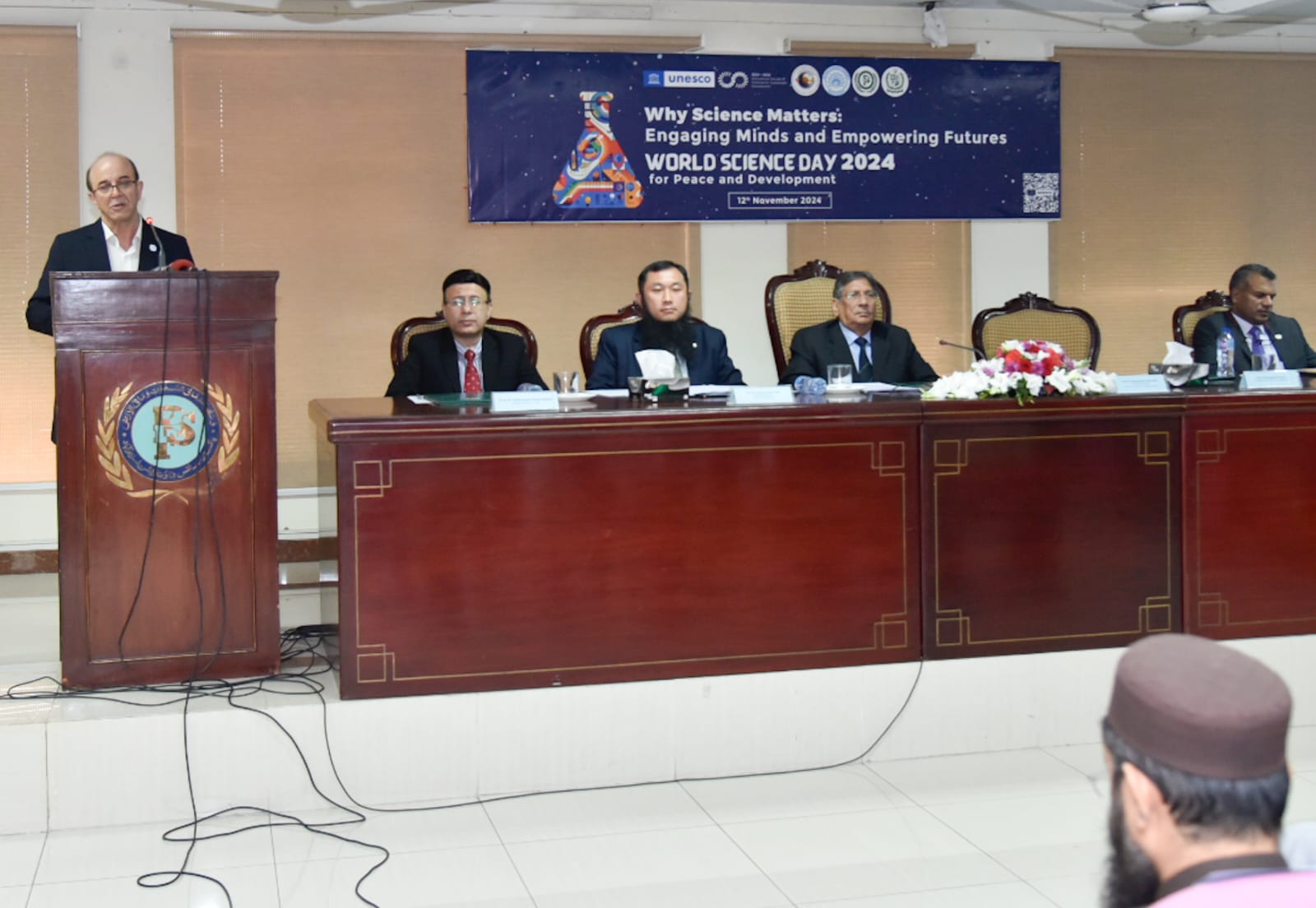By: M. Ilyas
Islamabad – To commemorate World Science Day for Peace and Development, UNESCO, in collaboration with the Pakistan Science Foundation (PSF), Economic Cooperation Organization Science Foundation (ECOSF), and the Pakistan Academy of Sciences, hosted an event at the Pakistan Science Foundation on 12 November 2024 in Islamabad. The event aimed to raise awareness about the critical role of science in modern society and its impact on addressing contemporary global challenges.
Celebrated annually since 2001, World Science Day highlights the vital role science plays in society and fosters public engagement in discussions about key scientific issues. This year’s theme, “Why Science Matters – Engaging Minds and Empowering Futures,” underscores the significance of science in shaping a sustainable and inclusive future.
The 2024 celebration holds additional significance as it coincides with the launch of the International Decade of Sciences for Sustainable Development (2024-2033), recently declared by the United Nations General Assembly (UNGA). Led by UNESCO, this decade-long initiative focuses on mobilizing the global scientific community to tackle complex challenges through interdisciplinary approaches. It encourages collaboration across diverse fields—from basic and applied sciences to social and human sciences, as well as emerging interdisciplinary domains. With an emphasis on resilience, equity, and environmental sustainability, the Decade supports the Sustainable Development Goals (SDGs) and a shared commitment to a safer, more prosperous world.
The event featured insightful remarks from Mr. Kar Hung Antony Tam, Officer-in-Charge of UNESCO Office in Pakistan, emphasizing the engagement of youth and women in science, technology and innovation; Prof. Dr. Muhammad Akram Shaikh, Member Science, PSF; Prof. Dr. Seyed Komail Tayebi, President, ECOSF; and Dr. Aneel Salman, Oil & Gas Development Company Limited (OGDCL)- Islamabad Policy Research Institute (IPRI) Chair of Economic Security at IPRI, who delivered a keynote on the pivotal role of science and technology in achieving a sustainable future for Pakistan. In his address, Chief Guest Prof. Dr. Aslam Baig, Secretary General, Pakistan Academy of Sciences, highlighted the role of Pakistani scientists in supporting the country in advancement of nuclear technology. He also emphasized on the importance of science and technology for Pakistan’s development.
Attendees included students, teachers, government officials, scientists, researchers, science communicators, and journalists who actively engage in the field of science.
As part of the day’s activities, an interactive science show for students was conducted by the Pakistan Science Club. The session focused on making science fun and accessible, aiming to ignite students’ interest in STEM (Science, Technology, Engineering, and Mathematics) fields.
The event was a reminder of science’s transformative potential and underscored the importance of empowering future generations to contribute to a sustainable and resilient Pakistan. UNESCO has long championed the role of science in fostering peace, development, and international cooperation, with a focus on building scientific capacities, promoting ethical standards, and advancing knowledge to address global challenges. Globally, UNESCO’s initiatives include establishing international frameworks such as the International Basic Sciences Programme (IBSP) and supporting collaborative research networks that connect scientific expertise across borders. In Pakistan, UNESCO, in collaboration with national and international partners, is actively implementing initiatives to popularize science and foster a culture of research and development within academia. These efforts include engaging Pakistani experts in regional and global discussions on science, technology, and innovation; promoting open science; and enhancing sustainable water and natural resource management practices. Through these initiatives, UNESCO is helping build a robust scientific infrastructure in Pakistan, encouraging local solutions to global challenges. This mission is now further amplified by UNESCO’s leadership of the newly launched International Decade of Sciences for Sustainable Development (2024-2033), aimed at mobilizing science for resilience, sustainability, and equity worldwide.



Comments are closed.